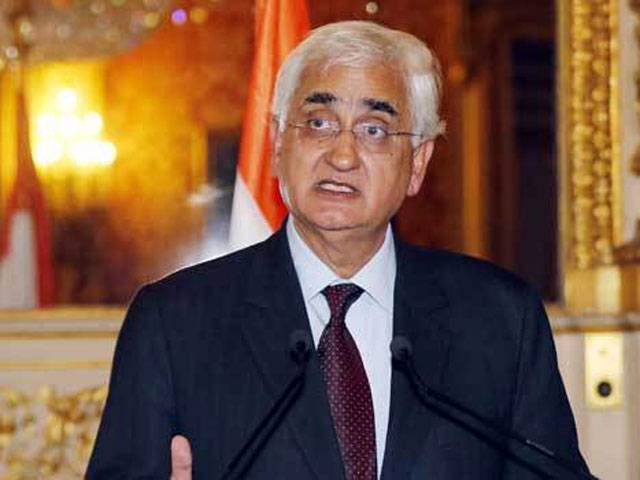NEW DELHI - India's foreign minister announced plans Thursday to visit China amid a border dispute, saying both countries had a mutual interest in not allowing it to "destroy" long-term progress in ties.
Amid growing calls in some quarters for a tougher line over the alleged incursion of Chinese troops in a remote Himalayan region, Foreign Minister Salman Khurshid said he would head to Beijing on May 9.
"I believe we have a mutual interest and we should not destroy years of contribution we have put together," Khurshid told reporters on the sidelines of a business event in New Delhi.
"I think it is a good thing that we are having a dialogue."
While not directly linking his visit to the border dispute, Khurshid will be the most senior Indian official to visit Beijing since its new leadership took over at the turn of the year. A senior foreign ministry official also confirmed reports that the new Chinese Premier Li Keqiang would travel to New Delhi late next month.
Lower-level talks have so far failed to break the impasse in the dispute in the western part of the mountainous Ladakh region, which erupted last week.
According to officials in New Delhi, a platoon of Chinese troops set up a camp inside Indian territory on April 15.
India has since called on the Chinese soldiers to withdraw, but several meetings between local army commanders and diplomats from both sides have failed to resolve the stand-off. China has denied any wrongdoing, a stance reiterated Thursday by the foreign ministry in Beijing.
"Chinese troops have always acted in compliance with the relevant treaties and protocols between the two countries regarding the peace and security of the area around the line of actual control," ministry spokeswoman Hua Chunying told reporters at a regular briefing.
"Chinese troops have never crossed the lines," she added.
The Times of India suggested the alleged incursion could be intended to pressure Delhi into signing a new border cooperation agreement or be in retaliation for efforts to strengthen the Indian army at the frontier. While the Indian foreign ministry has sought to downplay the incident, the army was pressing for "a show of force", the daily said on a page of reports entitled "Dragon At The Gate".
A foreign policy analyst in New Delhi said that India failed to resolve the border dispute largely because of an inherent "inferiority complex". "India must get its act together and the leaders must learn to demonstrate firmness in their dealings with China," Sujit Dutta, a professor at the Jamia Millia Islamia University, told AFP.
Dutta, who specialises in Indo-Chinese relations, said Beijing's new leadership was making a concerted effort to challenge India's resolve. "India will make a big mistake if this time it chooses to underplay the border dispute," said Dutta.
In his address on Thursday, Khurshid said India should not be intimidated by China. "We should not think that we are less than China because they have more nuclear bombs," he said.
In 1962 India lost a short but bloody war with China fought in Ladakh and Arunachal Pradesh in the northeast.
Small incursions are not uncommon across the Line of Actual Control (LAC), the de facto border that runs nearly 3,000 miles across the Himalayas, but it is rare for either country to set up camps on disputed territory.
In recent years, the two countries have increased their military presence on each side of the border and hold frequent meetings to defuse tensions.
Thursday, April 18, 2024
Indian FM to visit China amid border spat

1:55 PM | April 18, 2024
Stefanos Tsitsipas advances in Barcelona
4:19 PM | April 18, 2024
Met Office predicts more rains across country till April 29
2:51 PM | April 18, 2024
Punjab changes school timings for summer season
1:55 PM | April 18, 2024
Enemies of Pakistan are unable to digest investment in the country: Ataullah Tarar
1:29 PM | April 18, 2024
IHC restores Bushra Bibi's appeal for shifting to Adiala Jail from Bani Gala
1:24 PM | April 18, 2024
Hepatitis Challenge
April 18, 2024
IMF Predictions
April 18, 2024
Wheat War
April 18, 2024
Rail Revival
April 17, 2024
Addressing Climate Change
April 17, 2024
Justice denied
April 18, 2024
AI dilemmas unveiled
April 18, 2024
Tax tangle
April 18, 2024
Workforce inequality
April 17, 2024
New partnerships
April 17, 2024
ePaper - Nawaiwaqt
Advertisement
Nawaiwaqt Group | Copyright © 2024





